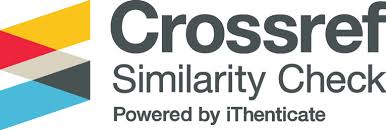Pengaruh Job Satisfaction dan Stres Kerja Terhadap Turnover Intention Pada Karyawan Bagian Produksi
Abstract
Turnover Intention is something that an employee wants to move at the company where they worked before. The trigger factor for a person to leave the organization is due to dissatisfaction with the payment received, and vice versa. This research raises the formulation of the problem regarding the Effect of Job Satisfaction, Work Stress on Turnover Intention of Production Section Employees at CV.UC Silver Gold Batubulan-Gianyar. This research was conducted on CV. UC Silver Gold Batubulan-Gianyar using a sample of 52 respondents, namely all employees of the production division of CV. UC Silver Gold Batubulan-Gianyar. The data analysis technique used in this study is the reliability validity test, classical assumptions, multiple linear regression, coefficient of determination, t test and F test.Based on the research results, it can be seen that: (1) Job Satisfaction has a negative and significant effect on Turnover Intention. (2) Job stress has a positive and significant effect on Turnover Intention. (3) Job Satisfaction and Job Stress have a positive and significant effect on Turnover Intention. The magnitude of the influence of the independent variable on customer satisfaction is 97.1%. In the future, CV.UC Silver Gold Batubulan-Gianyar needs to pay attention to the workload given to its employees, because excessive workloads will cause employees to become fatigued which has an impact on their performance.
References
Afandi, P. (2016). Concept & Indicator Human Resources Management for Management Research. Yogyakarta: Deepublish.
Chandio, F. H. et al. (2012). A Comparative Analysis of Various Information Systems Acceptance Models. Sindh University Research Journal (Sci. Ser.), 44 (2), 329–332.
Francesco, C. dan. (2000). Employee Demography, Organizational Commitment, and Turnover Intention in China : Do Cultural Diffrences Matter. 53(6).
Hartanto, J. (2009). Teori Portofolio dan Analisis Investasi Edisi Keenam. Yogyakarta: BPFE.
Jin N, et al. (2017). Early protection to stress mediated by CDK-dependent PI3,5P2 signaling from the vacuole/lysosome. J. Cell Biol, 216(7), 2075–2090.
Mangkunegara, A. P. (2005). Evaluasi Kinerja Sumber Daya Manusia, Penerbit Refika Aditama, Bandung.
Novliadi, P. (2007). Intensi Turnover Karyawan Ditinjau dari Budaya Perusahaan dan Kepuasan Kerja. Makalah : Fakultas Kedokteran, Jurusan Psikologi USU.
Qureshi, D. (2013). Relationship Between Job Stress, Workload, Environment and Employees Turnover Intentions: What We Know, What Should We Know. Jurnal World Applied Sciences, 23 (6), 764–770.
Robbins, P. S. (2008). No TitleOrganizational Behaviour, Tenth Edition (Perilaku Organisasi Ke Sepuluh).
Septiari, Ni Ketut. Ardana, I. K. (2016). PENGARUH JOB INSECURITY DAN STRES KERJA TERHADAP TURNOVER INTENTION KARYAWAN PADA HOTEL ASANA AGUNG PUTRA BALI.
Susskind, et al. (2000). Customer Sevice Employyes’ Behavioral Intentions and Attitudes : An Examination of Construct Validity and A Part Model. Hospitality Management, 19, 53 – 77.
Syahronica, G. (2015). Pengaruh kepuasan kerja dan stres kerja terhadap turnover intention (Studi pada karyawan departemen dunia fantasi PT Pembangunan Jaya Ancol, Tbk). Jurnal Administrasi Bisnis, 20(1).
Widiawati, F., Amboningtyas, D., Rakanita, A. M., & Warso, M. M. (2017). Pengaruh Beban Kerja, Stress Kerja Dan Motivasi Kerja Terhadap Turnover Intention Karyawan Pt Geogiven Visi Mandiri Semarang. Journal of Management, 3(3).
Umar, H. (2012). Metode Penelitian untuk Skripsi dan Tesis. Jakarta: Rajawali.
Yuda, Ida Bagus Dwihana. Ardana, K. (2017). Pengaruh Kepuasan Kerja Dan Stres Kerja Terhadap Turnover intention Pada Karyawan Hotel Holiday Inn Express. E-Jurnal Manajemen Unud, 6(10), 5319–5347.








